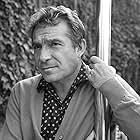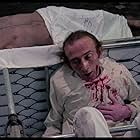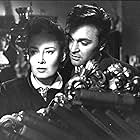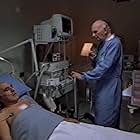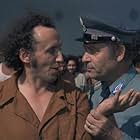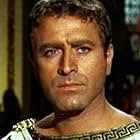My review was written in May 1983 after a screening on Manhattan's UES.
"Claretta and Ben" is an effective black comedy vehicle for Ugo Tognazzi. Filmed and released in Italy in 1974 with an original title that roughly translates as "Madam, Permit Me to Love Your Daughter", picture arrives Stateside at this late date (1983) on the latter-day popularity of Tognazzi from "La Cage aux Folles".
American release title refers in a play-within-the-film, penned by touring actor/playwright Gino Pistone (Tognazzi) as a starring vehicle for himself and his lover-leading lady Sandra (Bernadette Lafont, of French New Wave fame) to portray the romantic story of Benito Mussolini and his mistress Claretta Petracci.
Picture limns the travails of a modest theatre group touring the provinces, with director Gian Luigi Polidoro getting in swipes against the dreaded competitor television, the financial necessities whnich can force actors into porno jogbs and the inevitable (for an Italian film) political confrontations. When the troupe puts on its play in Mussolini's home region, the local communists throw rotten tomatoes at the actors and disrupt the performance until Gino finally wins them ove byh emphasizing the romantic side of the opus.
Still timely with its examination of the tendency to apologize for and romanticize the past (as witness recent Hitler diaries hoax), "Claretta" benefits from varied use of real locations and an unfamiliar supporting cast of talented, convincing types. Both Tognazzi and French thesp Lafont excel in their star turns. Tognazzi, who worked previously with Polidoro in such films as their never-released in the U. S. 1968 "Satyricon" (superseded by Fellini's version), is wonderful as the haughty, selfish ham actor, who gradually begins to live his role as Il Duce, actually shaving his head and becoming a petty tyrant. Well-dubbed in Italian, Lafont is a solid comic foil, especially effective in the on-stage scenes.


